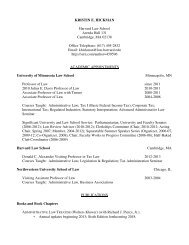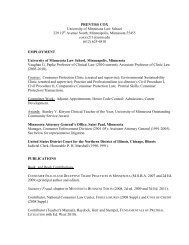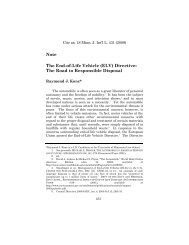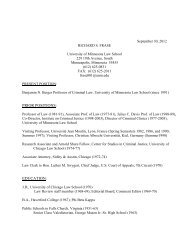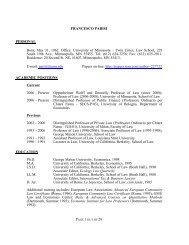Enabling Private Ordering - the University of Minnesota Law School
Enabling Private Ordering - the University of Minnesota Law School
Enabling Private Ordering - the University of Minnesota Law School
You also want an ePaper? Increase the reach of your titles
YUMPU automatically turns print PDFs into web optimized ePapers that Google loves.
2009] UMBRELLA CLAUSES 31<br />
investor-State cooperation more efficient.<br />
However, even under modern investment treaties <strong>the</strong> scope<br />
<strong>of</strong> <strong>the</strong> host State’s incapacity to make credible commitments<br />
under investor-State contracts persists. Although <strong>the</strong>se treaties<br />
provide for a number <strong>of</strong> specific investors’ rights, such as fair<br />
and equitable treatment and <strong>the</strong> protection against<br />
expropriation, and contain <strong>the</strong> host State’s general and advance<br />
consent to arbitration, <strong>the</strong> protection <strong>of</strong> contractual promises is<br />
still limited in <strong>the</strong> absence <strong>of</strong> an umbrella clause. In particular,<br />
fair and equitable treatment and <strong>the</strong> concept <strong>of</strong> expropriation,<br />
both direct and indirect, are interpreted in arbitral practice as<br />
being limited to breaches <strong>of</strong> a sovereign nature, thus excluding<br />
commercial State conduct. The traditional contract claim/treaty<br />
claim distinction <strong>the</strong>refore persists in investment treaty<br />
arbitration and limits <strong>the</strong> host State’s capacity to fully make<br />
credible commitments under treaties that do not contain an<br />
umbrella clause. The contract claim/treaty claim distinction<br />
plays out on two levels: <strong>the</strong> jurisdiction <strong>of</strong> treaty-based tribunals<br />
for breaches <strong>of</strong> investor-State contracts and <strong>the</strong>ir substantive<br />
protection.<br />
With respect to jurisdiction, arbitral tribunals consistently<br />
differentiate between contract and treaty claims. The tribunals<br />
support <strong>the</strong> holding that contract claims are, in principle,<br />
excluded from <strong>the</strong> jurisdiction <strong>of</strong> treaty-based tribunals. 76 The<br />
Annulment Committee in Aguas del Aconquija v. Argentina, for<br />
example, explained:<br />
A state may breach a treaty without breaching a contract, and vice<br />
versa . . . . In accordance with this general principle (which is<br />
undoubtedly declaratory <strong>of</strong> general international law), whe<strong>the</strong>r <strong>the</strong>re<br />
has been a breach <strong>of</strong> <strong>the</strong> BIT and whe<strong>the</strong>r <strong>the</strong>re has been a breach <strong>of</strong><br />
contract are different questions. Each <strong>of</strong> <strong>the</strong>se claims will be<br />
determined by reference to its own proper or applicable law—in <strong>the</strong><br />
case <strong>of</strong> <strong>the</strong> BIT, by international law; in <strong>the</strong> case <strong>of</strong> <strong>the</strong> Concession<br />
Contract, by <strong>the</strong> proper law <strong>of</strong> <strong>the</strong> contract. 77<br />
Arbitral tribunals have applied this distinction consistently.<br />
The result is <strong>the</strong> “well established” jurisprudence78 that a<br />
76. Exceptions to this principle exist, independently <strong>of</strong> <strong>the</strong> existence <strong>of</strong> an<br />
umbrella clause, if <strong>the</strong> treaty includes a broadly worded arbitration clause covering<br />
“any disputes relating to investments.” See infra Part III.B.2.<br />
77. Compañia de Aguas del Aconquija, S.A. and Vivendi Universal v. Argentine<br />
Republic, ICSID (W. Bank) Case No. ARB/97/3, Decision on Annulment, paras. 95–<br />
96 (July 3, 2002).<br />
78. Bayindir Insaat Turizm Ticaret Ve Sanayi A.S. v. Islamic Republic <strong>of</strong><br />
Pakistan, ICSID (W. Bank) Case No. ARB/03/29, Decision on Jurisdiction, para. 148




